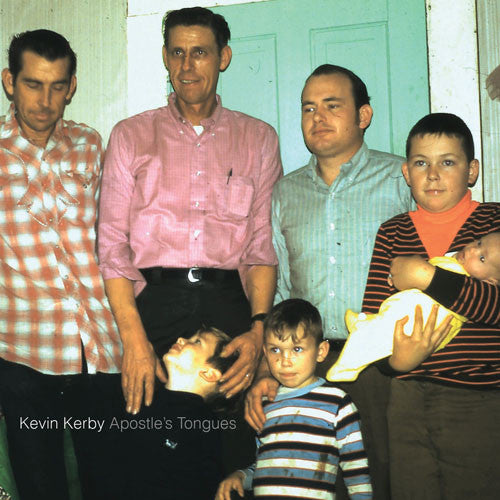Apostle's Tongues
$ 12.98
9 Songs | MR071 | Release Date 2012
Digital purchase options include: iTunes | amazon.com
It seems most folks who’ve been paying attention to music in Little Rock over the last couple decades or so have a story, or at least an opinion, about Kevin Kerby. Once you start to tally all these various tales, which I won't be going into here, you’re left with a grand total of a legend of sorts. I guess I know better the legend of Kerby than the man himself. I’ve had far more conversations about Kerby’s music than I’ve had conversations with him. “Apostle’s Tongues,” his latest album, released last month on Max Recordings, adds yet another chapter to that legend and gives us a little more insight into the man.
With its title track, the muted strings of Kerby’s acoustic guitar marking time for the entrance of Todd Beene’s pedal steel guitar work. If Beene’s name seems familiar, that most likely stems from his work with Glossary and Lucero. After the first two verses, Geoff Curran’s bass joins in the mix. Curran is also credited with the electric guitar and organ work that appears later, as well as recording and producing the album. Curran has worked extensively with Kerby as both a member of Mulehead and Battery. The song contains a central break/refrain after which Kerby’s son, Gus Kerby, joins in with his fiddle. This strong opener may well be the most layered of the nine tracks on what seems to be a stark and stripped-down album when compared with previous Kerby projects. There are no drums on any of the songs.
But don't confuse stark and stripped-down with simple and easy. Stark and stripped-down doesn't provide many places to hide flaws or mistakes, and it certainly does not foster poor or marginal writing. Kerby and his supporting cast seem to understand these challenges and meet them head on with confidence and competence.
The second song on the album, “My Suicide”, strips the mix even further, only using Kerby’s voice and acoustic guitar. The vocals are very strong here yet have a slight quiver to them. This seems fitting as the lyrics seem to be one man’s testament, addressing others’ perceptions or misperceptions about his own self-destructive attitudes and/or behaviors.
The third track “In a Room Full of Martyrs,” features some album's strongest writing: “Some call it love / Some call it hate / Some call it will / Some call it fate.” It is that kind of sharp, efficient, cut-you-to-the-bone kind of writing that will garner you the unofficial title, “Poet Laureate of Pulaski County.”
The final track, “Brown Bottle Flu,” is another example of economical and effective songwriting: “I am dry but not dried up / I haven’t reached the bottom / Just the bottom of my cup.”
I was fortunate enough to get the CD and limited edition lyric booklet. I urge you to get one if you still can. Each of the nine songs gets it own page and is paired with what I assume is a photo from the Kerby family archives on the opposite page. I cannot think of a single Kevin Kerby show I have been to that he did not mention his family in some way. Sometimes they might be the butt of the joke but I have no doubt that he places a high value on family. Given a picture that recently surfaced on the internet of what I am guessing is Scoutmaster Kevin Kerby, I would like to point out that I noticed no fewer than three Cub Scout uniforms… and possibly a den mother? I guess we can add a strong connection to Scouting to the already complex legend.
Kevin Kerby is in his 40s now. He’s been doing this songwriting thing for a minute or two. There has always been some piss, vinegar and angst in Kerby’s music. There still is now, but it's a more self-reflective, mature variety.
- Joe Meazle [Arkansas Times]



